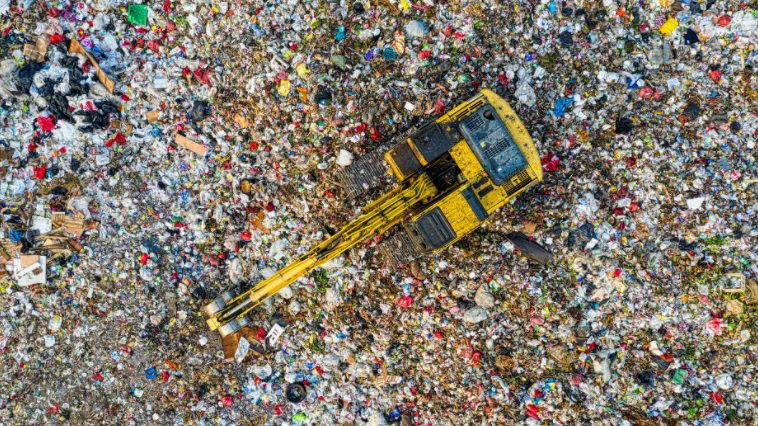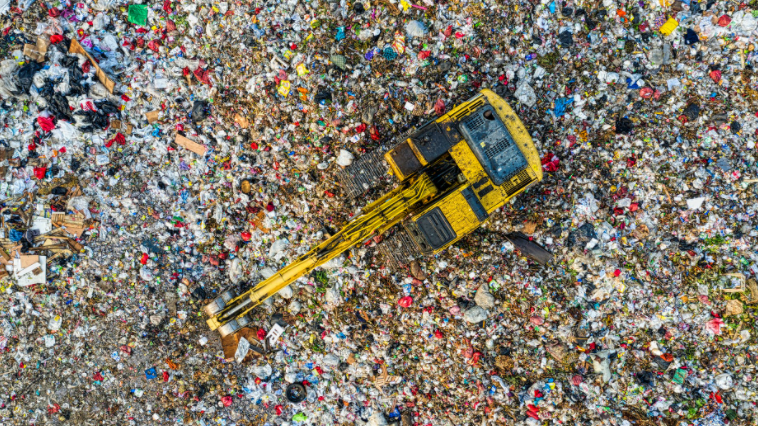By ESG McGill Analyst Max Bendjaballah

The latest reports from the Bureau d’audiences publiques sur l’environnement – an independent body working with Quebec’s Minister of Sustainable Development – indicates a pessimistic outlook for Quebec’s ability to manage the waste crisis over the long term. It advises the government to implement robust measures to tackle the problem more effectively. It also predicts that 25% of Quebec’s landfill capacity will be reached by 2030.
While public opinion generally focuses on the environmental impact of fossil fuels, less attention is paid to waste production. However, it plays an essential role in CO2 emissions. Moreover, it is consistent with the positive correlation between carbon emissions and GDP growth. Thus, based on the current global economic model, it is difficult to see how society could still function without increasing waste production and generating growth simultaneously. However, as Quebec’s inability to deal with waste shows, this economic system is bound to reach its limits. Indeed, 96% of annual waste is landfilled.
Despite technological advances to treat and recycle waste, it accumulates, and its production grows. The World Bank estimates that yearly total waste exceeds two billion tonnes. Unless dramatic action is taken, it is predicted to rise to 3.5 billion per year by 2050 and peak in 2100.
Many experts advocate a zero waste philosophy in the production system, in which economic actors cooperate to transform the waste management system. This strategy recognizes that industries will always generate residues and unwanted materials. However, this should not be an end in itself. Instead, waste is a resource that should be reused for further production. This circular economy would allow companies to pay less for material inputs by using the residues of others.
Nevertheless, reducing the overall waste production is the only significant change to address this major problem. In addition, there is an economic cost to increasing the amount of waste through the landfill tax in some countries, such as the UK and Quebec. This cost involves a company’s production process and the routine of workers/households. Therefore, employees’ habits should be oriented towards a waste-free lifestyle, in which they try to reduce their waste production at home and the workplace. Basic examples are plastic bottles, packaged food, coffee capsules, etc. For example, a progressive tax based on the waste bin size has resulted in a 26% reduction in waste production in Beaconsfield, Quebec.
In addition, studies show that waste reduction and better recycling are estimated to bring in an average of US$ 61 per person per year, for example, for municipalities by reducing costs such as electricity and water consumption. The same study pools high-income, upper-middle-income, lower-middle-income and low-income countries together. It infers that the aggregate economic benefits for materials like paper or metal would generate dozens of billions of economic benefits. However, voluntary measures have yet to prove to be able to change people’s minds, especially for companies that have not changed their dumping habits. It is still cheaper for a firm to throw away than to recycle, undermining any hope for change.
This philosophy must go beyond incentives by banning single-use plastic and other non-recyclable, single-use materials. Other policies should include penalties for planned obsolescence and implement a “right to repair” to prevent companies from encouraging customers to buy new products when old ones could be repaired. Despite the BAPE’s warning last year regarding landfill capacity, waste production in Quebec is still rising at the beginning of 2023, according to Recyc-Québec. This increase is partly due to increased construction, renovation and demolition projects. In response, the government has increased the provincial landfill levy from $20.69/tonne to $30/tonne, which is not expected to trigger much change from large companies, which appear to be the biggest polluters.
Although the zero waste philosophy has not yet revolutionized the economic system in Quebec, there is no need to be pessimistic. Indeed, the belief that households can drastically reduce waste production is becoming widespread. For example, since 2018, the average mass of household waste has decreased by 5%, a minor quantitative change but a major one for the zero waste philosophy.
In summary, if the provinces and states, in general, want to organize a coherent project to reduce their waste accumulation significantly, they must focus on reducing waste generation rather than relying entirely on recycling and waste treatment. Furthermore, this project will only work if companies are forced to use and repair their waste before considering disposal. Therefore, a necessary condition is that firms realize the opportunity cost for alternative waste management.

